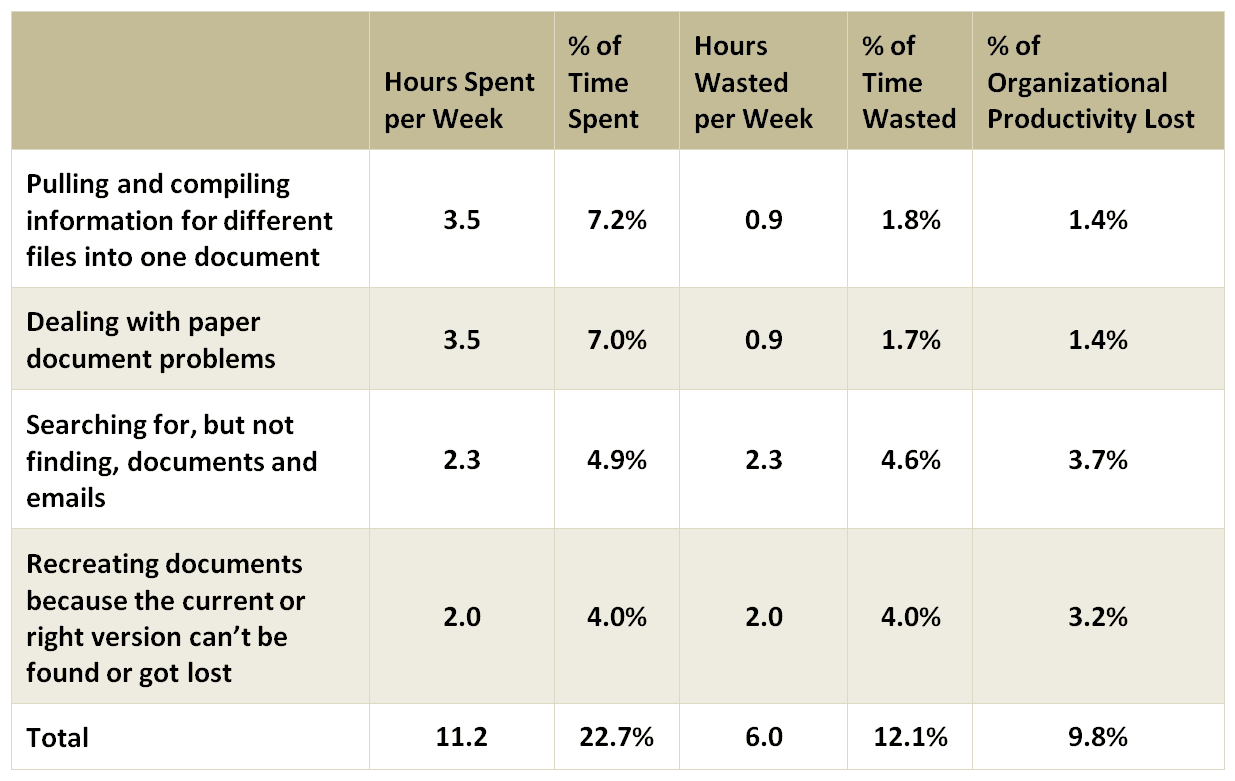A new legal industry study finds a substantial decline in attorney productivity in recent years, significantly reducing law firm profitability. In its 2017 Report on the State of the Legal Market, Thomson Reuters notes that “over the past 10 years, the average billable hours worked by all lawyers across the market declined from 134 billable hours per month in 2007 to 122 through the late part of 2016.” This equals a reduction of 144 billable hours per year per lawyer. The report, by multiplying that total by the average worked rate ($463) for all lawyers in 2016, determined the productivity decline is costing law firms about $66,672 per lawyer per year.
One of the main causes for diminished lawyer productivity is the exponential proliferation of their stored emails and documents and the associated inability to recall important work product and previous e-mail communications. Another industry study assessing the productivity of lawyers and other high-end information knowledge workers found that such professionals on average spend 11.2 hours a week dealing with challenges related to document creation and management. As the table below from the IDC report demonstrates, lawyers and paralegals lose as much as 2.3 hours a week searching, but not finding, the right documents and emails and another 2 hours recreating documents they failed to locate.
Time Spent on Document Management Challenges
 Source: IDC’s Information Worker Survey, June 2012
Source: IDC’s Information Worker Survey, June 2012
Applying the same lawyer cost calculations used by Thomson Reuters in their 2017 report (4.3 hours per week X $463 average hourly rate X 49 annual worked weeks) reveals that an effective search capability can dramatically improve law firm productivity by as much as $97,500 annually per lawyer. Even normalizing this analysis for recovered billable time (assuming every hour of gained productivity results in less than a full hour of actual billable time) a law firm of a 1000 attorneys would realize tens of millions per year in recovered billable hours, in addition to important intangible benefits including enhanced work product, improved client satisfaction and attorney morale.
Many law firm attorneys tell us that without the right search solution, they can spend hours looking for a past proposal, a key client communication from several months prior, or many other forms of work product and client communications that are stored in emails, local drives or cloud file shares. If lawyers and paralegals cannot quickly find such information assets, then that represents a serious information governance failure. Time wasted rummaging around for past emails and documents is not billable time and directly cuts into a firms’ profit margin. To be sure, a law firm’s two most important assets are its professionals and their body of work product and other key information. As such, a top priority for law firm management should be to ensure their attorneys have the right productivity search solution to quickly find and retrieve the firms’ information assets.
However, the recurring theme we hear is that outside of the data managed by X1, enterprise search is a source of major frustration for law firms and other organizations. This is confirmed by survey after survey where the vast majority of respondents report dissatisfaction with their current enterprise search platform. Simply put, the traditional approach to enterprise search has not worked. This is largely because most search solutions deployed in recent years focused on IT requirements — which see search as either a technical project or a commodity — rather than an intimate end-user driven requirement that is core to their professional productivity.
And for lawyers especially, “good enough” is not good enough when it comes to their search. It does not make sense to invest in an enterprise search solution for business productivity search, unless there is a significant improvement in the end-users search experience for emails, files and SharePoint data.
At X1, however, many of our customers report dramatic improvements with their productivity search, with firm-wide X1 rollouts being major wins at their organization. We believe that X1’s unique focus on the end-user is the key. You won’t find many other business productivity search solutions where the end users drive demand, instead of the tool being imposed on the end-users by IT or systems integrators. We continually hear countless testimonials from business professionals, at law firms and companies large and small, who swear by their X1 and cannot imagine working without it. In speaking with industry analysts and other experts in the enterprise search field, this is an almost unheard of phenomenon, where end-user satisfaction with the companies’ enterprise search platform is usually around 10-15 percent, verses the 80-85 percent satisfaction ratio we see with X1.
Importantly, X1 is a platform. Users need a single-pane-of-glass view to all of their information – email, files, SharePoint, archives like Veritas Enterprise Vault, OneDrive, Box and other network and cloud sources. X1 Search provides a user-friendly interface to all information that lets attorneys find what they are looking for in an instant. But the thousands of X1 end users know all this. The key takeaway for CIOs and other IT executives is that search is an inherently personal user experience, and the number one requirement, by far, for a successful search initiative is enthusiastic end-user adoption. If the lawyers and other business professionals in your organization are not passionately embracing the search solution, then nothing else matters.
